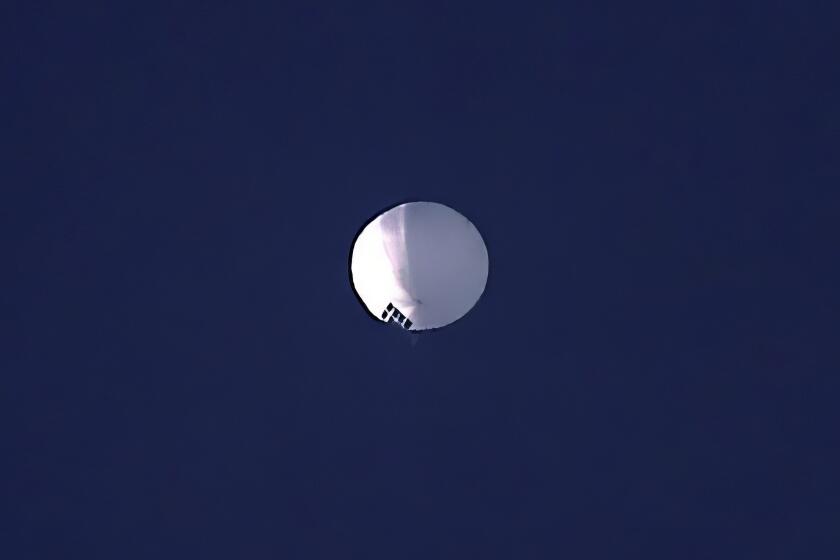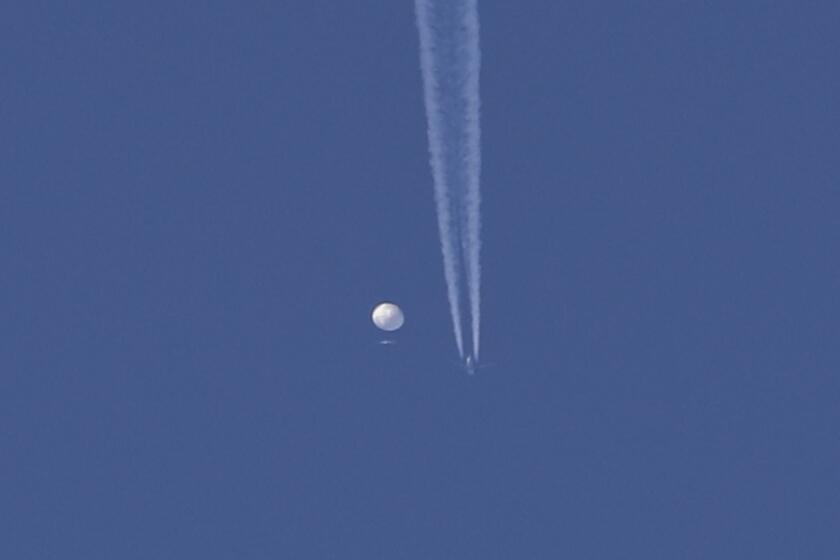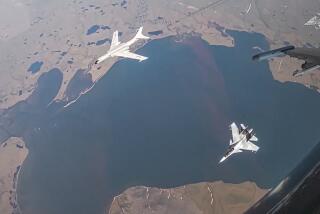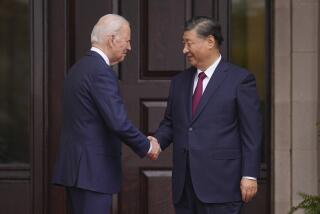U.S. shoots down object of unknown origin flying near Alaska’s northeast coast

The object was flying at about 40,000 feet and posed a ”reasonable threat” to civilian flights, a National Security Council spokesman said. The president ordered the military to take down the object, he added.
WASHINGTON — A week after Americans were transfixed by a Chinese balloon traversing the nation on an alleged spy mission until it was shot from the sky over the Atlantic Ocean, the U.S. military on Friday downed a high-flying object in U.S. airspace off Alaska.
White House officials, who revealed the news when a reporter asked about rumors of the craft, said the unidentified object was shot down by a U.S. Air Force fighter jet because it was flying at about 40,000 feet and posed a “reasonable threat” to the safety of civilian flights.
National Security Council spokesman John F. Kirby said that unlike the earlier craft, a huge balloon transporting a massive payload, there was no immediate evidence that this flying object was engaged in surveillance.
President Biden, asked about the downing of the object as he met with the president of Brazil, said that “it was a success.”
He has been criticized in some quarters for waiting several days to order the destruction of the Chinese balloon on Saturday, and appears to have acted particularly quickly this time.
Friday’s incident and the flurry of activity surrounding it come as U.S. citizens and officials are on edge over revelations of an apparently vast and pervasive Chinese espionage program involving sophisticated balloons, which U.S. officials say have flown over 40 nations in five continents in the last several years.
Fear of Chinese surveillance plays into heightened tensions between the U.S. and China over trade and suspicions of subversive actions.
Last week’s balloon, officials say, was equipped to eavesdrop and collect U.S. communications, potentially from sensitive military installations including nuclear missile silos. Its detection prompted Secretary of State Antony J. Blinken to cancel an important diplomatic mission to Beijing last weekend, which would have been the first such visit by a U.S. official of his level in nearly five years.
U.S. officials did not describe the object that was shot down Friday as a balloon. Kirby said that unlike the earlier craft, which was said to be the width and length of three buses, the object shot down near Alaska was only the size of a “small car.”
Biden was briefed about the aerial device on Thursday night and U.S. fighter jets flew past it to assess whether it was manned, Kirby said. It was not, the pilots determined.
“We’re going to remain vigilant about our airspace,” Kirby said. “The president takes his obligations to protect our national security interests as paramount.”
He said that Biden ordered the Pentagon to shoot the object down, and that it then crashed in frozen waters in a northeastern swath of Alaska near the U.S.-Canada border.
It was not immediately clear whether Canada had been involved in the detection of the new device as it had with the earlier craft.
The remains of the device should be relatively easy to recover, having landed on ice. It has been a difficult mission for U.S. Navy and Coast Guard divers and scavenge crews to collect the pieces of last week’s balloon, many of which are submerged deep underwater off South Carolina.
A massive white orb flying across U.S. airspace has triggered a diplomatic maelstrom and is blowing up on social media.
Kirby said that the origin of the latest object was not known and that the U.S. would study it after retrieving its debris.
In ordering the downing of an object flying over a remote corner of the country despite little intelligence about its origin and capability, the president is signaling that he can act swiftly following heavy criticism about the handling of the alleged Chinese spy balloon.
“The president doesn’t regret the way that we handled the first balloon,” Kirby said. “This was the size of a small car and it was over a sparsely populated area, but also, more critically, it was over water space when we ordered this down, as we did the last one.”
In a separate briefing at the Pentagon, a military spokesman echoed Kirby’s assertion that it was unclear who owned or operated the downed device.
“It wasn’t an aircraft per se,” said Brig. Gen. Pat Ryder, noting the object did not take evasive action or change course and was incapable of maneuvering.
He said the unidentified object was downed by a single missile as it traveled in a northeastern direction across Alaska.
“Recovery is happening in a mix of ice and snow,” Ryder added.
The U.S. on Saturday downed a suspected Chinese spy balloon off the Carolina coast after it traversed sensitive military sites across North America and became the latest flashpoint in tensions between Washington and Beijing.
Officials are still analyzing material recovered from the balloon that was shot down over the Atlantic last weekend. But they say they are certain the aircraft was part of a large fleet that the Chinese military has built and deployed to spy on countries around the world.
Beijing has denied the allegation, saying the balloon was a weather research vehicle operated by civilians that accidentally floated off course and into U.S. airspace. China has accused Washington of “overreacting” in shooting down the balloon, and has threatened to retaliate.
But as more such objects are detected, including at least one balloon over Latin America and a number in Europe, those denials become harder to sustain, U.S. officials say.
The episode further strains relations between Beijing and Washington, already at odds over numerous issues including human rights, the sovereignty of Taiwan, and trade and tariffs.
The secretary of State’s canceled trip was intended to begin to ease some of that friction. Blinken has said he will reschedule the visit, but only when conditions are appropriate.
More to Read
Get the L.A. Times Politics newsletter
Deeply reported insights into legislation, politics and policy from Sacramento, Washington and beyond. In your inbox three times per week.
You may occasionally receive promotional content from the Los Angeles Times.














